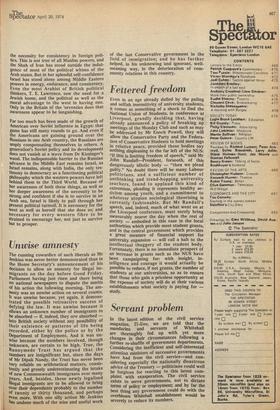Israel—to survive and to prosper
Last week we suggested, tentatively and from a distance, that Israeli politicians would be best advised if they attended more to the underlying unity of their state, to the necessities of its existence, than to the squabbles of their parties. Alas, with a guerrilla massacre in Israel itself, and with an Israeli reprisal in Lebanon, the political tension in Tel Aviv and Jerusalem has tightened rather than loosened. True, according to the Israeli foreign minister, Mr Eban, there is no such thing as a caretaker government known to the Israeli constitution, and we may look forward to seeing Mrs Meir in effective power for some months yet: but the politics of Israel is still in the gravest danger of becoming a confused democratic simulacrum of the politics of her neighbours.
And that ought not to happen. Our awareness in Europe, and particularly in this country, of how much we owe, in spiritual as in material terms, to the state of Israel, and of how much we may still owe in the future, is as yet underdeveloped; but the debt is real nonetheless. It needs to be re-stated in Britain, especially at a time when some hostility to that state is again making itself a force in British politics. From the Balfour Declaration to and through the Suez operation there has been a material British interest in the maintenance and sustenance of a Jewish state, as well as a moral concern that the Jews should have a home. Before he left this country the last Israeli Ambassador Mr Michael Comay — probably one of the most effective emissaries of any state to attend the Court of St James in recent years — argued publicly that the material British interest in Israel was now, and had been for some time, a determining factor.
The material interest depends in the first instance on our awareness of the importance of having a stable, strong, like-minded nation in existence in the Middle East. There is nothing that can be called stability in any Arab country: we scarcely know the leaders of Syria and Iraq, much less are we able to deal with them; the regime in Saudi Arabia is dependent on the precarious health of the king; and President Sadat, who now seems so securely enthroned in Egypt, is likely to prove as evanescent as Nasser. There is almost no contract an Arab country has made in international politics which has not been broken, no awareness or understanding on their part of the necessity for consistency in foreign politics. This is not true of all Muslim powers, and the Shah of Iran has stood outside the indulgence of most of the political whims of the Arab states. But in her splendid self-confidence Israel has stood alone among Middle Eastern Powers in energy, endurance, and consistency. Even the most Arabist of British political thinkers, T. E. Lawrence, saw the need for a Jewish home, and the political as well as the moral advantage to the west in having one. Only in the Britain of the 'seventies does that awareness appear to be languishing.
Far too much has been made of the growth of American over Soviet influence in Egypt: that game has still many rounds to go. And even if the Americans are gaining ground over the Russians in one Arab country, the Russians are amply compensating themselves in others. A generation's Soviet policy and its development does not vanish at a wave from Dr Kissinger's wand. The indispensable barrier to the Russian advance in the Middle East remains Israel, as Israel remains, along with India, the only testimony to democracy as a functioning political Philosophy which the western powers have left behind them in the Third World. Because of her awareness of both these things, as well as her deeper awareness of the necessity to be strong and confident if she is to survive in an Arab sea, Israel is likely to pull through her Present political turmoil. It is necessary for the West as well as herself that she does so; and necessary for every western fibre to be strained to encourage her, not just to survive but to prosper.



































